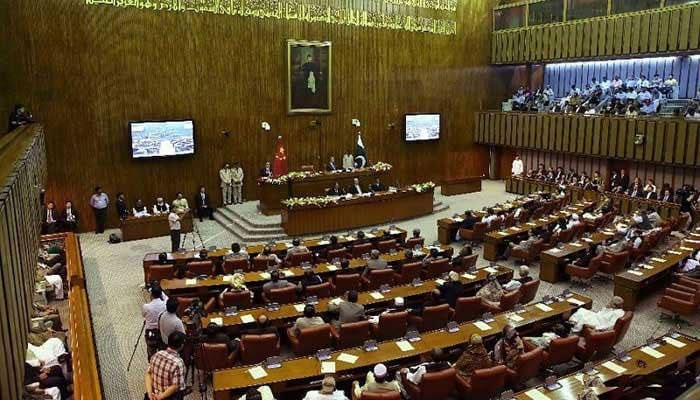Military courts?
The Senate of Pakistan, the upper house of parliament, has endorsed a resolution asserting that the Supreme Court’s judgment on military courts encroaches upon the legislative prerogatives of parliament. The resolution emphasizes that actions against terrorists should be conducted through military courts, which have been in operation since 1967.
Here’s a partial list of countries that try civilians in military courts: United States, Turkey, India, Egypt, Russia, Columbia, South Korea, Bangladesh, Iran, Israel, Syria, Saudi Arabia, North Korea, China, Myanmar, Afghanistan, Iraq, Libya, Sudan, Yeman, Bahrain, United Arab Emirates, Oman, Qatar, Ukraine, Algeria, Nigeria, Venezuela, Brazil, Mexico, Philippines, Indonesia, Malaysia, Brunei, Singapore, Sri Lanka, Vietnam, Laos, Cambodia, Zimbabwe and Uganda.
In the US, the trial of civilians in military tribunals is regulated by the Military Extraterritorial Jurisdiction Act (MEJA) and the Uniform Code of Military Justice (UCMJ). The US has military commissions designed to try civilians involved in terrorism or violations of the laws of war. Lincoln conspirators, all civilians, were tried by a military commission. President Bush established military commissions through an executive order to try civilians suspected of terrorism-related offenses.
In 2016, Turkish military courts tried civilians, including journalists, academics, and activists. The legal basis for trying civilians in military courts was the ‘Decree Law No 667,’ which granted the military judiciary jurisdiction over civilians accused of crimes related to the coup attempt. This decree, along with subsequent amendments, empowered military courts to hear cases that would typically fall under civilian jurisdiction.
In India, the Armed Forces Special Powers Act (AFSPA) grants special powers to the armed forces allowing for the trial of civilians in military courts. In 1993, the government invoked the Terrorist and Disruptive Activities (Prevention) Act (TADA) to try civilians accused in the 1993 Bombay Bombings Case.
In 2007, some three-dozen civilians, all members of the Muslim Brotherhood, were tried in military courts in Egypt. Three Al Jazeera journalists, who were arrested on charges of spreading false news were also tried in a military court. In 2018, a top auditor, who was arrested on the charge of spreading false news harmful to the military, was tried in a military court. The same year, an Egyptian journalist was tried in a military court for charges that included spreading false news and joining an outlawed group. Civilians in Egypt can be tried in military courts under Law No. 25 of 1966, commonly known as the ‘Law on the Protection of the Armed Forces’.
Russia employs military courts to try civilians under the ‘Federal Law on Countering Terrorism.’ Similarly, Bangladesh utilizes the Bangladesh Army Act for trying civilians in military courts. In Myanmar, the president holds the authority to sanction the trial of civilians in military courts. Bahrain, in 2017, amended its constitution to confer powers upon military courts for the trial of civilians. Singapore has the Internal Security Act (ISA), which allows for the trial of civilians in military courts. In Iran, the ‘Law of the Establishment and Jurisdiction of Revolutionary Courts,’ allows civilians to be tried in military courts.
To be certain, according to the International Covenant on Civil and Political Rights (ICCPR), civilian trials in military courts are not expressly prohibited, provided that three fundamental principles are upheld: the right to a fair trial, the presumption of innocence, and the right to legal representation.
The writer is a columnist based in Islamabad. He tweets/posts @saleemfarrukh and can be reached at: farrukh15@hotmail.com
-
 Eric Dane's Costar Under Fire For Hurling Accusations At Him After His Death
Eric Dane's Costar Under Fire For Hurling Accusations At Him After His Death -
 Queen Camilla Greets The Paddington Bear At BBC’s 500 Words Grand Final
Queen Camilla Greets The Paddington Bear At BBC’s 500 Words Grand Final -
 Chinese Astronauts Finally Reveal Why Spacecraft Left Them ‘stranded’ For 437 Days In Space
Chinese Astronauts Finally Reveal Why Spacecraft Left Them ‘stranded’ For 437 Days In Space -
 Sinitta Makes Shock Admission About Marriage To Andy Willner Post Simon Cowell Heartbreak
Sinitta Makes Shock Admission About Marriage To Andy Willner Post Simon Cowell Heartbreak -
 Bill Gates Calls Ties To Jeffrey Epstein 'huge Mistake,' Reveals Past 'affairs'
Bill Gates Calls Ties To Jeffrey Epstein 'huge Mistake,' Reveals Past 'affairs' -
 Switzerland Announces One-time Compensation For Swiss Bar Fire Victims
Switzerland Announces One-time Compensation For Swiss Bar Fire Victims -
 Ryan Coogler Shares Thoughts About Building Community Of Actors Amid 'Sinners' Success
Ryan Coogler Shares Thoughts About Building Community Of Actors Amid 'Sinners' Success -
 Heidi Klum Gushes Over Diplo Collab 'Red Eye' Despite DJ Falling Asleep During Video
Heidi Klum Gushes Over Diplo Collab 'Red Eye' Despite DJ Falling Asleep During Video -
 Israel Behind Majority Of Journalist Deaths Worldwide, Watchdog Claims
Israel Behind Majority Of Journalist Deaths Worldwide, Watchdog Claims -
 'It Would Become A Circus' : Inside Jane's Turmoil For 'little Sister' Fergie Whose Hidden From The World
'It Would Become A Circus' : Inside Jane's Turmoil For 'little Sister' Fergie Whose Hidden From The World -
 Inside Cardi B's Real Feelings Related To Stefon Diggs Split Post One Year Of Romance
Inside Cardi B's Real Feelings Related To Stefon Diggs Split Post One Year Of Romance -
 Former Sri Lankan Intelligence Chief Arrested Over 2019 Easter Bombings
Former Sri Lankan Intelligence Chief Arrested Over 2019 Easter Bombings -
 Kristen Bell Shares One Rule For 'SAG' Awards Ceremony That She Will Ditch This Time: 'Happy And Fun'
Kristen Bell Shares One Rule For 'SAG' Awards Ceremony That She Will Ditch This Time: 'Happy And Fun' -
 Woman Suing Meta Platforms, YouTube Over Social Media Addiction Sticks To Claims After Trial
Woman Suing Meta Platforms, YouTube Over Social Media Addiction Sticks To Claims After Trial -
 Shakira Applauded For 'gracious' Behaviour By Fans As She Blends Work With Family Downtime
Shakira Applauded For 'gracious' Behaviour By Fans As She Blends Work With Family Downtime -
 Mexico’s President Considers Legal Action Over Elon Musk Cartel Remark
Mexico’s President Considers Legal Action Over Elon Musk Cartel Remark




